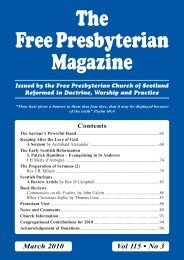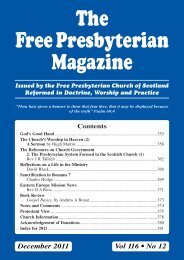February - the Free Presbyterian church of Scotland
February - the Free Presbyterian church of Scotland
February - the Free Presbyterian church of Scotland
You also want an ePaper? Increase the reach of your titles
YUMPU automatically turns print PDFs into web optimized ePapers that Google loves.
52<br />
The <strong>Free</strong> <strong>Presbyterian</strong> Magazine<br />
overruled all <strong>the</strong> events <strong>of</strong> his life, asked himself: “But why does God delight<br />
to keep us at uncertainties in our spiritual allowances?” And he answers his<br />
own question thus: “Surely it is to convince us <strong>of</strong> His sovereignty, to train<br />
us up in <strong>the</strong> life <strong>of</strong> faith, to prevent our building tabernacles here, and make us<br />
think highly <strong>of</strong> our mercies from <strong>the</strong> danger <strong>of</strong> losing <strong>the</strong>m; finally, it may<br />
be to stir up in our hearts a longing desire for celestial glory, where we shall<br />
never lose <strong>the</strong> enjoyment <strong>of</strong> God.” 6<br />
It was a sore trial for Heywood to be ejected from his <strong>church</strong>. When his<br />
wife died not long before <strong>the</strong>n, he described his loss as “sharper than any<br />
trial I have met with before”. Yet he described his ejection as “more bitter”<br />
still. He went on to describe <strong>the</strong> conditions imposed by <strong>the</strong> Act <strong>of</strong> Uniformity<br />
as “too hard to be accepted”, and he added, “Woe be to us if we preach not<br />
<strong>the</strong> gospel! But a double woe to us if we enervate <strong>the</strong> gospel by legal ceremonies.<br />
Our people’s souls are precious, and we ought to take care <strong>of</strong> <strong>the</strong>m;<br />
but our own souls are precious also, and we must not destroy <strong>the</strong>m under<br />
pretence <strong>of</strong> saving those <strong>of</strong> o<strong>the</strong>rs. Our work is dear to us; but God is dearer,<br />
and we must not do <strong>the</strong> least evil to obtain <strong>the</strong> greatest good.<br />
“There are worldly advantages enough to sway us to conformity, if conscience<br />
did not answer all <strong>the</strong> pleas <strong>of</strong> flesh and blood. Should we forsake<br />
our Christian liberty and put our necks under such a yoke as nei<strong>the</strong>r we nor<br />
our fa<strong>the</strong>rs were able to bear? Should we build again what we have destroyed<br />
and make ourselves transgressors? Should we violate solemn covenants, leave<br />
<strong>the</strong> work <strong>of</strong> reformation and return to Egypt? It is surely better to suffer affliction<br />
with <strong>the</strong> people <strong>of</strong> God than to enjoy <strong>the</strong> pleasures <strong>of</strong> sin for a season.<br />
The bargain would be too hard, to provide our livelihood by making shipwreck<br />
<strong>of</strong> faith and a good conscience. God can advance His work without our sinful<br />
shifts, and rear up monuments to His glory without our complying prevarications;<br />
suffering may benefit <strong>the</strong> gospel as much as service, when God calls<br />
to it. . . . It is no pleasure for us to be idle; fain would we be labouring in <strong>the</strong><br />
Lord’s vineyard; but alas we are hindered, and woe be to <strong>the</strong>m by whom <strong>the</strong><br />
<strong>of</strong>fence comes!” Then Heywood quotes <strong>the</strong> verse: “Verily <strong>the</strong>re is a reward<br />
for <strong>the</strong> righteous: verily He is a God that judgeth in <strong>the</strong> earth”. 7<br />
Joseph Alleine had been minister, from 1655, <strong>of</strong> Taunton in Somerset. His<br />
wife Theodosia gives an account <strong>of</strong> his thoughts about how he should act in<br />
<strong>the</strong> changed circumstances following <strong>the</strong> Restoration and goes on to describe<br />
his subsequent activity: “Before <strong>the</strong> Act <strong>of</strong> Uniformity came forth, my husband<br />
was very earnest day and night with God that his way might be plain<br />
to him, that he might not desist from such advantages <strong>of</strong> saving souls, with<br />
6 The Whole Works <strong>of</strong> Oliver Heywood, London, 1827, vol 1, pp 87-8.<br />
7 Works, pp 92-3.

















